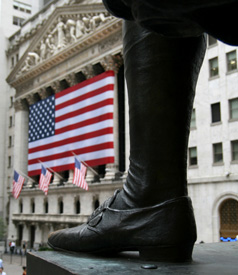Support justice-driven, accurate and transparent news — make a quick donation to Truthout today!
Welcome to the brave new world of post-bailout capitalism. The Commerce Department announced Tuesday that corporate profits are at their highest level in U.S. history, and the Fed released minutes of an early November meeting in which officials predicted a stagnant economy and continued high unemployment.
The lead on the New York Times story read like a line from a Dickens novel: “The nation’s workers may be struggling, but American companies just had their best quarter ever.” What the Times story neglected to mention is that the bulk of the increase in corporate profits was nabbed by the financial industry rather than manufacturing and other productive sectors. A whopping $33.3 billion out of the total corporate profits increase of $44.4 billion went to the banks and investment houses that those same workers had bailed out with their tax dollars.
Much of the rest of the corporate profit, in the non-financial sector, was also taken out of the hides of workers through increased “productivity” growth—meaning they had produced more for less personal income. Case in point: the plant that GM is reopening in Orion Township, Mich., where, under a deal negotiated with the beleaguered UAW union, 40 percent of the workers crawling through cars on the assembly line will be paid 15 bucks an hour. That’s about half the traditional UAW wage.
The Obama administration now feels totally vindicated for bailing out GM. Such a deal. Let’s offer up half a clap for the news that GM came back from bankruptcy to mount a successful IPO and pay something back to the taxpayers, which is better than nothing. Some jobs were saved, and that prospect was why folks like me supported this bailout in the first place.
Click here to sign up for Truthout’s FREE daily email updates.
Don’t call it a success story: The government unloaded some of its GM stock holdings at a $10.67 loss over the average per-share price it paid for its $49.5 billion investment. As the Bloomberg news service noted, “The Treasury, which is taking a loss on its portion of the sale, will break even only if the shares climb more than 60%,” referring to the GM shares the Treasury still holds.
Nor should we ignore the fact that GM is a shadow of its former self and its rosier prospects for long-term survival depend primarily on job creation in China, where GM is already a major presence. Or that GMAC, the carmaker’s former credit operation, is still majority-owned by the U.S. government and is busily foreclosing on the homes of people they hustled into subprime and otherwise dubious mortgages.
GMAC was no different from others in the financial industry in securitizing mortgages that it should have known were toxic. Restructured as Ally Financial, the company was split off from GM, taking along its burdened debt obligations and benefiting from $17.2 billion in bailout money. Like the other financial outfits, Ally has enjoyed a range of government support through the Federal Reserve and Treasury. Not so the folks to whom GMAC sold crappy mortgages that are being foreclosed at an alarming rate.
The assumption of both the Bush and Obama administrations was that what was good for the banks would be good for the general economy, but just the opposite has happened. While the financial sector flourishes, the economy stagnates. As The Wall Street Journal reported in its story on the release of the Fed minutes: “Federal Reserve officials downgraded their outlook for the U.S. economy … projecting that the jobless rate could exceed 8% for two more years and that it won’t return to its former vitality for five years or more.”
Guess what? The financial benefits are not trickling down. Throwing money at the banks has been as effective as pushing on a string, and the result has been what former Fed Chairman Paul Volcker has excoriated as a “liquidity trap.” No serious government pressure has been brought to bear on the banks to help homeowners stay in their homes through mortgage payment adjustments.
What has occurred is what former International Monetary Fund chief economist Simon Johnson referred in The Atlantic back in May of 2009 as “The Quiet Coup,” in which the financial industry is fully in charge of the government’s response to our economic problems. The result, he noted, is “the reemergence of an American financial oligarchy” that had been broken by the banking regulations imposed during the New Deal in response to the Great Depression. Franklin Delano Roosevelt’s sensible regulations were gutted by Bill Clinton and George W. Bush, and tragically Obama has failed to restore them. The Wall Street lobbyists got their way and unfettered greed prevails. How else to explain last quarter’s outrageous profit figures?
Trump is silencing political dissent. We appeal for your support.
Progressive nonprofits are the latest target caught in Trump’s crosshairs. With the aim of eliminating political opposition, Trump and his sycophants are working to curb government funding, constrain private foundations, and even cut tax-exempt status from organizations he dislikes.
We’re concerned, because Truthout is not immune to such bad-faith attacks.
We can only resist Trump’s attacks by cultivating a strong base of support. The right-wing mediasphere is funded comfortably by billionaire owners and venture capitalist philanthropists. At Truthout, we have you.
Truthout has launched a fundraiser, and we have only 24 hours left to raise $17,000. Please take a meaningful action in the fight against authoritarianism: make a one-time or monthly donation to Truthout. If you have the means, please dig deep.
